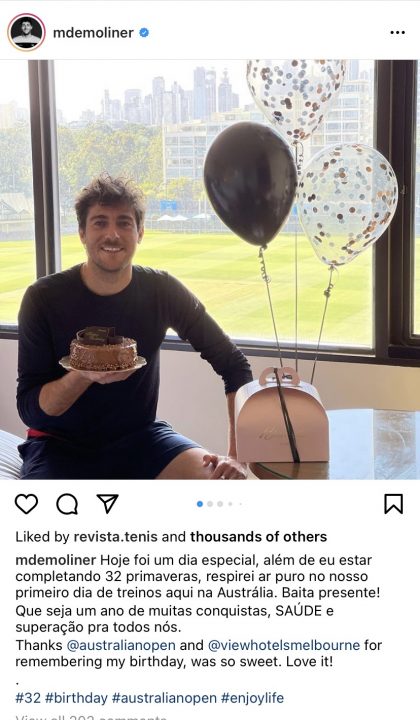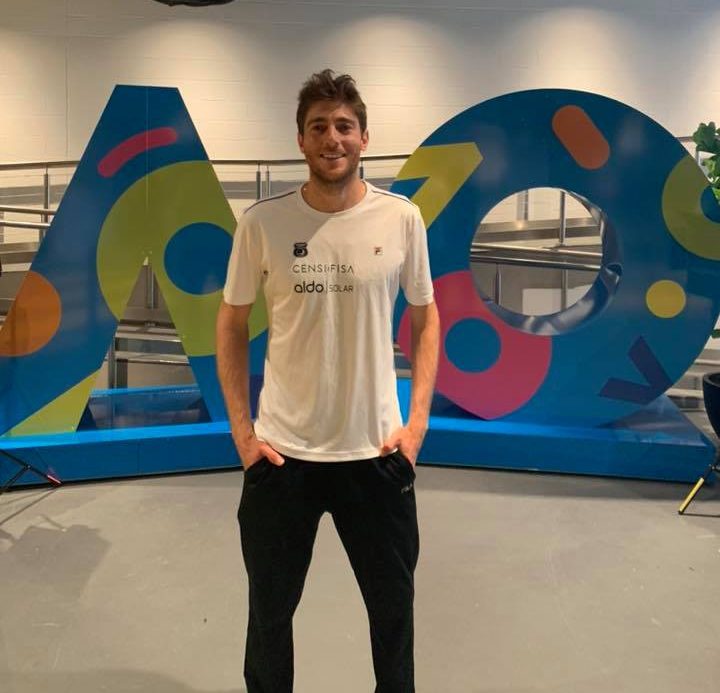Like his peers, Brazil’s Marcelo Demoliner passes his time in Melbourne quarantine by training, sleeping, eating and posting amusing videos on social media.
Demoliner, who currently has a doubles ranking of world No.44, is required by Australian law to abide by a strict isolation period before he is allowed to play any professional tournament. Although he is allowed to train unless he is deemed to be a close contact of somebody who has tested positive for COVID-19. An unfortunate situation 72 players find themselves in, including Demoliner’s doubles partner Santiago Gonzalez
During an email exchange with UbiTennis the Brazilian sheds light on what he labels as an ‘usual experience’ that has prompted criticism from some players. Roberto Bautista Agut was caught on camera describing conditions as a ‘prison’ in a video leaked to the press. Although he has since apologised for his comments. Demonliner himself is not as critical as others.
“It is an unusual experience that we will remember for a long time,” he told UbiTennis. “It is a very complicated situation that we are going through. Obviously, it is not ideal for us athletes to be able to go out for just 5 hours a day, but mainly for the other 72 players who cannot go out, like my partner Santiago Gonzalez. They have a complicated situation of possibly getting injured after not practicing for 14 days, but it is what it is.’
“We need to understand and adapt to this situation considering Australia did a great job containing Covid.”
With three ATP doubles titles to his name, Demoliner is playing at the Australian Open for the sixth year in a row. He has played on the Tour for over a decade and has been ranked as high as 34th in the world.
Besides the players complaining about food, their rooms and even questioning the transparency of the rule making, Tennis Australia also encountered a slight blip regarding the scheduling of practice.
“I was a little lucky because I stayed in one of the hotels that we don’t need to take transportation to go to the training courts. It made the logistics issue much easier. The other two hotels had problems with transportation and logistics in the first two days, but I have nothing to complain about, honestly.”
Demoliner remains thankful for what Tennis Australia has managed to do in order for the Australian Open to be played. Quarantine can have a big impact on a person mentally, as well as physically. Each day players spend at least 19 hours in their hotel rooms which was no fun for the Brazilian who celebrated his 32nd birthday on Tuesday.
“Without a doubt, it is something we have never been through before. I’m luckily having 5 hours of training daily. I am managing to maintain my physical preparation and rhythm. It is not the ideal, of course, but I can’t even imagine the situation of other players who are in the more restricted quarantine.”

Priority given to the top names
As Demoliner resides in Melbourne, a selected handful of players are spending their time in Adelaide. Under a deal struck by Tennis Australia, officials have agreed for the top three players on the ATP and WTA Tour’s to be based in the city. The idea being is that it will relieve the strain on Melbourne who is hosting in the region of 1200 arrivals.
Craig Tiley, who is the head of Tennis Australia, has insisted that all players will have to follow the same rules wherever they are based. Although some feel that those in Adelaide have some extra privileges such as a private gym they can use outside of the five-hour training bubble. Japan’s Taro Daniel told the Herald Sun: “People in Adelaide are being able to hit with four people on court, so there’s some resentment towards that as well.” Daniel’s view is one echoed also by Demoliner.
“I do believe they are receiving preferential treatment, quite different from us. But this is part of the tour,” he said.
“The top tennis players always had these extras, we are kinda of used to it. We came here knowing that they would have better conditions for practicing, structure, hotels… they also have merits to have achieved all that they have to be the best players in the world. I don’t know if it’s fair, but I believe the conditions could be more similar than they are in this situation.”
Some players were recently bemused by a photo of Naomi Osaka that surfaced on social media before being removed. The reigning US Open champion was pictured on a court with four members of her team, which is more people than what those in Melbourne are allowed to train with.
As the Adelaide contingent continues their preparations, those most unhappy with them are likely to be the 72 players who are in strict quarantine. Demoliner is concerned about the elevated risk of injury that could occur due to the facts they are not allowed to leave their rooms. All players in this situation have been issued with gym equipment to use.
“I think that they will be at a considerable disadvantage compared to who can train. But we need to obey the law of the country, there is not much to do … until the 29th they will have to stay in the room and that is it,” he said.
“Whether it is fair or not, it is not up to me to say because I am not in this situation. The thing about having the other players who didn’t have contact with the positive cases to also stay in the rooms is the concern about the risk of injury, specially for singles players. It will be a tough challenge, especially at the beginning of the season.”
In recent days, officials have been holding video calls with players to discuss ways to address these concerns ahead of the Australian Open. Which will start a week after they are allowed to leave their rooms.
When the tournaments do get underway there are also questions about how the public will react to players who have made headlines across the country for their criticism of the quarantine process. A somewhat sore point for Australian’s with some nationals unable to return home due to the government restrictions. On top of that, people in Melbourne are concerned about a potential outbreak of COVID-19.
“It is a very complex situation. I fully understand the reaction of the Australian population considering the recent events… the effect that the players are bringing, the risks to the population,” Demoliner said of the current circumstances.
“We know this and obviously they are concerned with the whole situation, which is still very uncertain. On our side, though, they did allow us to come here to play. It is important to remember that the decision to welcome us was approved by the Australian Government, otherwise we would not be here.”
Demoliner is one of three Brazilian doubles players ranked to have a top 100 ranking on the ATP Tour along with Bruno Soares and Marcelo Melo.
SEE ALSO – EXCLUSIVE: Inside The Melbourne Bubble – ‘Players Can’t Act Like Spoilt People’






